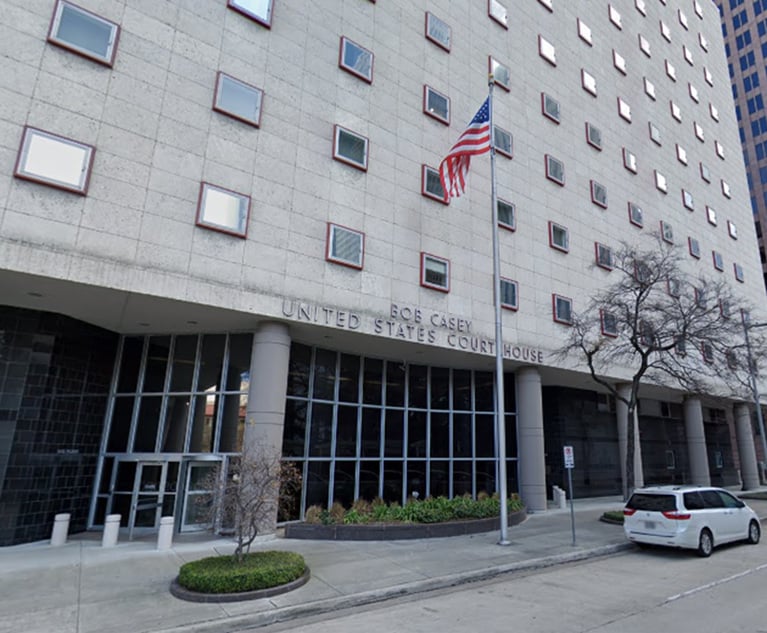 Credit: Photobank/Adobe Stock
Credit: Photobank/Adobe Stock 'No One to Teach Me': How an Attorney Working From Her Dining Room Table Helped Create Path Back for Disbarred Attorneys
"In the end, you are going to lose. But I believe we can change the law," attorney Donald M. Lomurro said he told his client, Dionne Laurel Wade.
October 21, 2024 at 01:53 PM
6 minute read
The original version of this story was published on New Jersey Law Journal
After a Black woman solo practitioner representing an underserved community in Paterson was disbarred, she found herself in an unlikely position: at the center of the push to change that rule.
When Donald M. Lomurro met with Dionne Laurel Wade, he immediately realized two things: she would be disbarred, and her case presented a unique opportunity.
Wade was losing her law license after a random audit revealed a $12,000 shortfall in her trust account. Lomurro, the managing partner at Lomurro Munson, was at least the fifth attorney she consulted to help her. Wade, who began her law practice at a dining room table in a housing project, had spent her career working in her community, often for free or a low fee, helping people through bankruptcy or divorce.
"When Dionne came into my office, she already interviewed multiple lawyers who told her to surrender her license," Lomurro told the Law Journal. "They said there is no reason to continue the fight because In re Wilson is clear: you will be disbarred."
But Lomurro described Wade as a special person. She worked pro bono cases, volunteered with Northeast New Jersey Legal Services, and set up free law clinics at her church.
"I told Dionne, in the end, you are going to lose," Lomurro said. "But I believe we can change the law. The question is are you willing to go through this fight and argue that permanent disbarment is inappropriate in your case?"
She said, "Mr. Lomurro, that is what I will do."
Those broader efforts paid off, as last week, the New Jersey Supreme Court released an administrative determination that offered disbarred attorneys a pathway back to the law for the first time in 45 years.
During an oral argument session before the state Supreme Court in September 2021, Lomurro had told the justices he felt "an awesome responsibility to Dionne Wade."
"From the day she came in after other lawyers turned her down, I said, 'I will not leave you behind,'" Lomurro told the high court. "Because she represents the best in the practice of law."
Wade testified on her own behalf before the high court that she simply did not know how to manage the financial side of her law practice. She credited the Office of Attorney Ethics with giving her its time and patience when it came to her office and taught her how to keep her books.
"I had no one to teach me the intricacies of running a law practice," Wade told the high court. "I had no one to teach me how to balance a checkbook. There was no way I was going to be exposed to three-way reconciliation or advised about what to do about a trust account or ledger cards."
Wade's story was incredibly sympathetic. She told the Supreme Court how she was raised in a housing project in Passaic by a single mother who struggled with drug addiction. By the time she was in high school, her brother was incarcerated, and she knew she wanted to be a lawyer. According to her testimony, earning her undergraduate degree took nine years, and then she went to law school.
Wade said her recordkeeping was meticulous in the four and a half years since this started and pleaded with the court not to take the law license she had worked so hard to attain.
"After the Office of Attorney Ethics came in for the audit, Dionne took courses and was mentored by another lawyer of color," Lomurro said. "For the six years between the random audit and the final disposition by the Supreme Court, her account was never out of balance again. So you have to say to yourself, isn't this the person who could change this draconian law?"
Lomurro said that it is crucial to recognize that not everyone has the same chance to succeed in life and that Wade is the quintessential example of a person who deserves a second chance.
"Dionne fought the fight," Lomurro said. "And we won."
Wade declined, through her attorney, to be interviewed on her case, but Lomurro said she is extremely grateful to have a path back to her license.
On Oct. 15, the Supreme Court issued an administrative determination and order opening up reinstatement for disbarred attorneys, laying out 10 prerequisites and numerous other conditions for readmission. The move marked a sharp change from decades of precedent.
In re Wilson is the 1979 New Jersey Supreme Court case that established the mandatory disbarment standard for knowing misappropriation. In its decision in Wade's case, the court declined to revisit Wilson, but said it was time to revisit the rules on permanent disbarment.
To that end, the high court ordered a committee to consider the issue, which became known as the Wade Committee, inextricably linking Wade's name with the decision to allow attorneys a potential path back to the law after disbarment in New Jersey.
The high court's administrative determination noted that the majority of the committee determined that "human beings are capable of change; that offering Wilson violators a second chance is consistent with contemporary notions of redemption, reconciliation, and restorative justice; and that, with proper vetting of the lawyers seeking readmission, both the public and the reputation of the bar can be protected and perhaps even better served."
Former New Jersey State Bar Association President Jeralyn Lawrence of Lawrence Law in Watchung, who formed the Putting Lawyers First Task Force and spent much of her presidency addressing the well-being of the state's attorneys, called the rule change "awesome."
"This is an amazing day for New Jersey lawyers," Lawrence told the Law Journal. "We now join 41 other states in allowing lawyers a path back to their license to practice law. We are capable of change and redemption, so allow us the opportunity to do that. We are so grateful to the New Jersey Supreme Court to allow this narrow path back."
Current NJSBA President William H. Mergner Jr. of Leary, Bride, Mergner & Bongiovanni said the document changing the rules on disbarment gives insight into how the high court has evolved in its view of the circumstances that lead to disbarment.
"This was a long time coming," Mergner said. "The issue was studied carefully. You can see the thoughtfulness that went into the New Jersey Supreme Court's approach."
Mergner also noted that the path back from disbarment is not only available to those lawyers who lost their license for misappropriation.
Robert B. Hille, a partner with Greenbaum Rowe Smith & Davis in Roseland, argued the NJSBA's case before the state's high court, where he pointed out a problem with the knowing-misappropriation standard.
"In the Wade decision that Chief Justice Stuart Rabner wrote, he said that New Jersey had become an outlier in disbarment," Hille said. "Branches of government do not often change course. I really give the court a lot of credit for going ahead and reexamining the permanency of the punishment."
NOT FOR REPRINT
© 2025 ALM Global, LLC, All Rights Reserved. Request academic re-use from www.copyright.com. All other uses, submit a request to [email protected]. For more information visit Asset & Logo Licensing.
You Might Like
View All
Texas Bankruptcy Judge Withdraws Ethics Complaint Against Jackson Walker
2 minute read
Conspiracy Suits Against Quinn Emanuel, Roc Nation Moved to Federal District Court

Former U.S. Dept. of Education Attorney Suspended for Failure to Complete CLE Credits
3 minute readLaw Firms Mentioned
Trending Stories
Who Got The Work
J. Brugh Lower of Gibbons has entered an appearance for industrial equipment supplier Devco Corporation in a pending trademark infringement lawsuit. The suit, accusing the defendant of selling knock-off Graco products, was filed Dec. 18 in New Jersey District Court by Rivkin Radler on behalf of Graco Inc. and Graco Minnesota. The case, assigned to U.S. District Judge Zahid N. Quraishi, is 3:24-cv-11294, Graco Inc. et al v. Devco Corporation.
Who Got The Work
Rebecca Maller-Stein and Kent A. Yalowitz of Arnold & Porter Kaye Scholer have entered their appearances for Hanaco Venture Capital and its executives, Lior Prosor and David Frankel, in a pending securities lawsuit. The action, filed on Dec. 24 in New York Southern District Court by Zell, Aron & Co. on behalf of Goldeneye Advisors, accuses the defendants of negligently and fraudulently managing the plaintiff's $1 million investment. The case, assigned to U.S. District Judge Vernon S. Broderick, is 1:24-cv-09918, Goldeneye Advisors, LLC v. Hanaco Venture Capital, Ltd. et al.
Who Got The Work
Attorneys from A&O Shearman has stepped in as defense counsel for Toronto-Dominion Bank and other defendants in a pending securities class action. The suit, filed Dec. 11 in New York Southern District Court by Bleichmar Fonti & Auld, accuses the defendants of concealing the bank's 'pervasive' deficiencies in regards to its compliance with the Bank Secrecy Act and the quality of its anti-money laundering controls. The case, assigned to U.S. District Judge Arun Subramanian, is 1:24-cv-09445, Gonzalez v. The Toronto-Dominion Bank et al.
Who Got The Work
Crown Castle International, a Pennsylvania company providing shared communications infrastructure, has turned to Luke D. Wolf of Gordon Rees Scully Mansukhani to fend off a pending breach-of-contract lawsuit. The court action, filed Nov. 25 in Michigan Eastern District Court by Hooper Hathaway PC on behalf of The Town Residences LLC, accuses Crown Castle of failing to transfer approximately $30,000 in utility payments from T-Mobile in breach of a roof-top lease and assignment agreement. The case, assigned to U.S. District Judge Susan K. Declercq, is 2:24-cv-13131, The Town Residences LLC v. T-Mobile US, Inc. et al.
Who Got The Work
Wilfred P. Coronato and Daniel M. Schwartz of McCarter & English have stepped in as defense counsel to Electrolux Home Products Inc. in a pending product liability lawsuit. The court action, filed Nov. 26 in New York Eastern District Court by Poulos Lopiccolo PC and Nagel Rice LLP on behalf of David Stern, alleges that the defendant's refrigerators’ drawers and shelving repeatedly break and fall apart within months after purchase. The case, assigned to U.S. District Judge Joan M. Azrack, is 2:24-cv-08204, Stern v. Electrolux Home Products, Inc.
Featured Firms
Law Offices of Gary Martin Hays & Associates, P.C.
(470) 294-1674
Law Offices of Mark E. Salomone
(857) 444-6468
Smith & Hassler
(713) 739-1250









